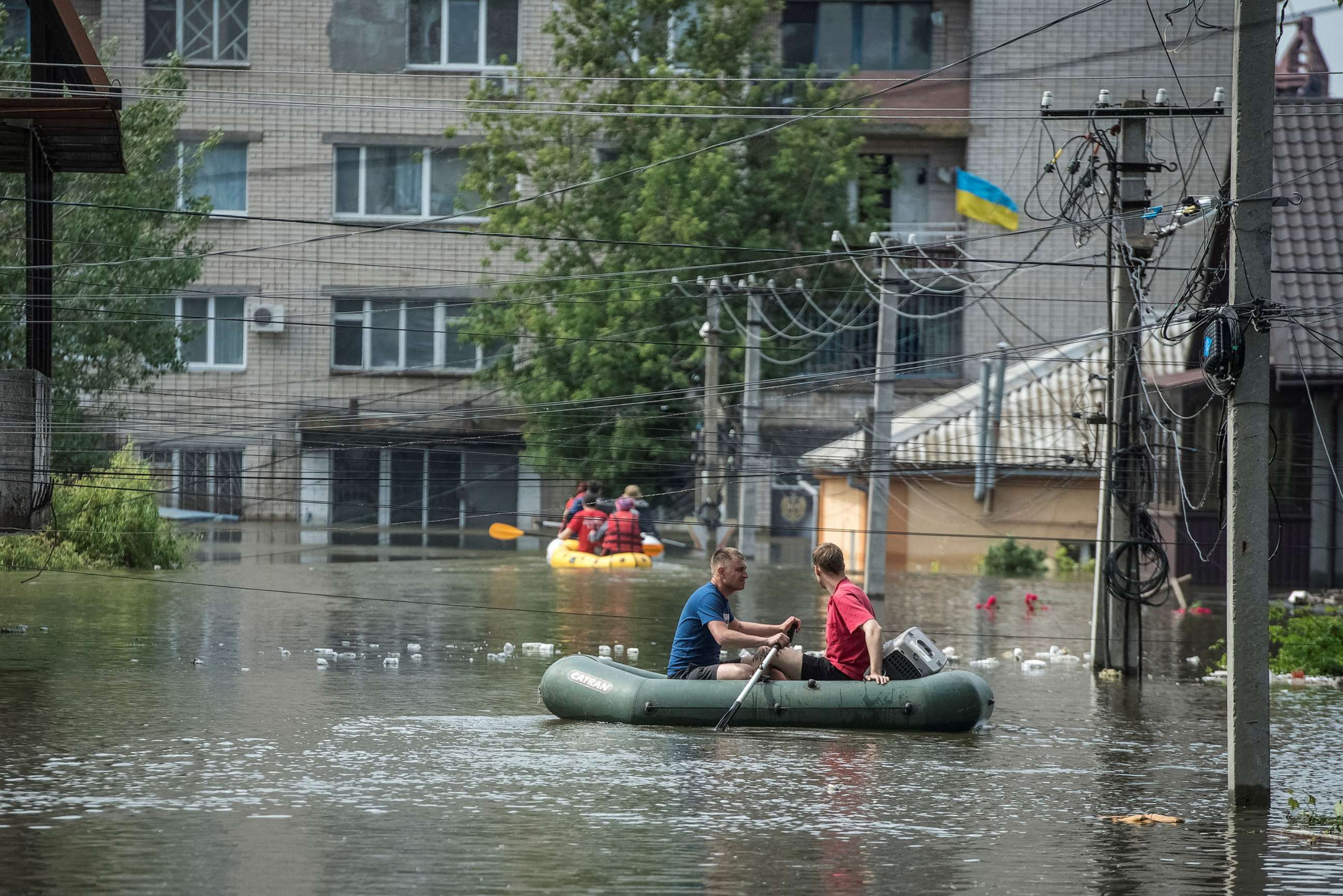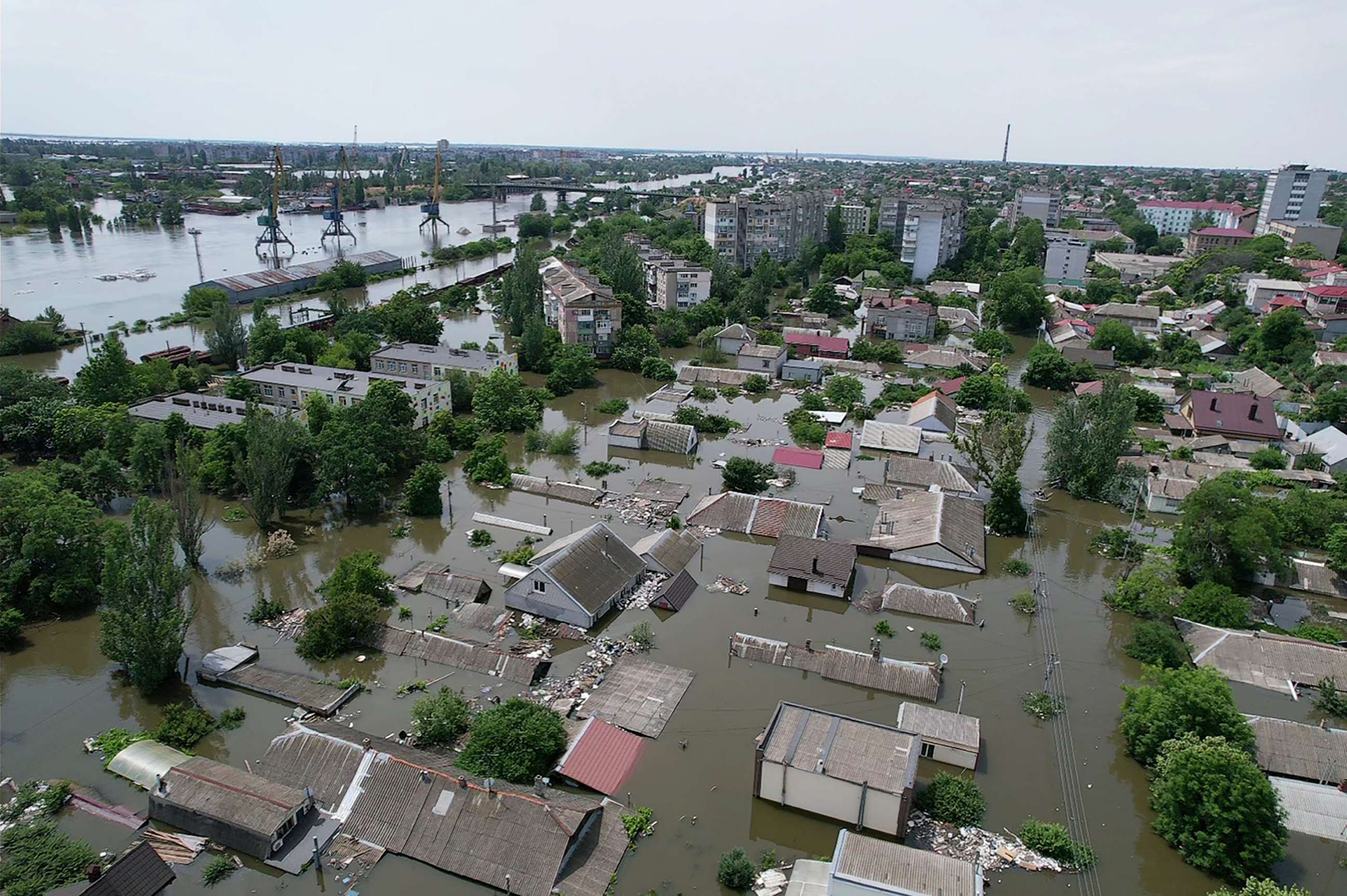At least 9 dead in Kakhovka dam collapse in Ukraine, officials say
"It's a situation of despair," the governor of Kherson told ABC News.
At least nine people were killed by the devastating flooding caused by destruction of the Nova Kakhovka dam in the Kherson region of Ukraine and nine injured during the shelling the Russians did during the evacuation , local authorities said.
Regional Governor Oleksandr Prokudin said the average water level is more than 5 meters and around 600 square kilometers are now flooded, mostly on the eastern bank which is occupied by the Russian troops.
The accurate number of wounded from Tuesday's incident may be higher as it's nearly impossible to evacuate people from there, authorities say. The Ukrainian mayor of Oleshky, Tatyana Gasanenko, almost all of which is under water now, said 30 people were rescued and hospitalized with hypothermia.
"It's a situation of despair," she told ABC News. "People were sitting on the rooftops for hours. They said the Russians just ran away."

The Nova Kakhovka dam, which was built in 1956 and traverses the enormous Dnipro River in southern Ukraine, suffered an explosion Tuesday at approximately 2 a.m. local time as a deluge of water could be seen bursting through the dam that had previously held back more than 18 cubic kilometers of water -- comparable to the size of the Great Salt Lake in Utah.
The dam's breach could have a massive impact on the wider war effort between Russia and Ukraine.
On local telegram groups, people are begging for help and posting coordinates of their relatives' houses. One of them, Anna Molchan, told ABC News her elderly parents and their pets are still waiting for help.
"They told me on the phone they are ok physically and their neighbors, old people, are on the rooftops too," she said.

On the western bank, which is under Ukrainian control, more than 2,000 people have been evacuated, many of them are elderly and children.
"We lack practically everything," Maksym Trykur, Officer at the State Special Transport Administration, told ABC News. "Boats, walkie-talkies, generators, first necessity things… because what happened is unprecedented. All services are involved. Sappers are doing an amazing job clearing the mines carried by the flow… Everyone is working on the verge of their possibilities."
According to him, evacuation is carried out mainly by the state services and hundreds of volunteers, who rushed to help from other regions, including Kyiv.
"Unfortunately, I don't see here those international organizations that are supposed to work in such places," he said.

Ukraine President Volodymyr Zelenskyy called upon the Red Cross and other organizations to help Ukraine overcome the consequences of the destruction of the dam.
"Each person who dies there is a verdict on the existing international architecture and international organizations that have forgotten how to save lives" he said in his nightly address on Wednesday. "It is even impossible to establish for sure how many people in the temporarily occupied territory of Kherson region may die without rescue, without drinking water, without food, without medical care."
Zelenskyy visited the flooded areas, evacuation points and hospitals in the Kherson and Mykolaiv region on Thursday. His international platform United24 launched fundraising for lifeboats, motor pumps, diving suits and other things for rescuers. They continue working despite the Russian continued shelling of the city of Kherson that injured at least nine people, according to the interior ministry.
The United Nations said it will form special groups in Zaporizhzhia and Kherson that will go to the occupied areas of Kherson region to provide humanitarian aid and organize evacuation of people only if Russia guarantees safe passage for the UN groups to occupied areas.
Around 20,000 households in Kherson remain without electricity due to the destruction of the dam, but in general the situation is stable, the energy ministry said. The capacity is enough to cover the needs in the customers although Ukraine had to temporarily import electricity from the neighboring countries on Wednesday while reducing the work of other hydro power plants up the river.
Ukrhydroenergo, Ukrainian's state regulator, said this will help to reduce water flow for a bit.
Another side of the destruction of the dam is a colossal damage to the local ecosystem, ecologists said.
"The floodwater will wash through cemeteries, landfill sites, and fields with fertilizer, heavily polluting the water. This will change the population of birds and fishes. It will destroy their breeding systems," Kateryna Polianska, an ecologist from the Ukrainian Environment People Law NGO, told ABC News.
"Fish leave their eggs near dams as the water temperatures are higher, now these eggs will be destroyed. Birds have already changed their migratory routes owing to war. This is additional upheaval," Polianska said.
Professor Yevhen Korzhov, Kherson State Agrarian and Economic University, paints a bleak picture of the long-term consequences of the dam breach.
"Only with the assistance of people, scientists and everyone who can be useful, it will be a period of at least 10 years until the ecosystem starts new connections again. But the old ecosystem will no longer exist. It will be very difficult to save red book species that are used to living in freshwater," Korzhov told ABC News.

The Ministry of Agrarian Policy and Food of Ukraine predicts the flooding of 10 thousand hectares of farmland on the western bank of the Kherson region, and also several times more on the eastern one. For Ukraine, a major global producer and exporter of grain, the breach has left 94% of irrigation systems in Kherson without a water source, 74% in Zaporizhzhya and 30% in Dnipropetrovsk regions. The agriculture ministry warns the fields in the south of Ukraine risk turning into "deserts" and around a million tons of harvest can be lost.
The Ukrainian prosecutor general's office said they submitted "all necessary information" about the dam detonation to the International Criminal Court.
"An attack on the Kakhovka HPP — a civilian facility containing dangerous forces — is a war crime. We will do everything to bring the culprits to justice," he said in a statement.
Zelenskyy said the dam was destroyed by the inside detonation. Last year, Ukrainian military intelligence warned that the Russian troops that control the area booby-trapped the dam. In November, Maxar published satellite images showing the significant damage of the dam.
Although the Russians have blamed the Ukrainian troops, Ukrhydroenergo said that Kakhovka Hydroelectric Power Plant (KHPP) could not be destroyed by an impact from the outside.
"It was designed and built to withstand a nuclear strike," the company's engineers said.
The destruction of the KHPP would not have been possible if the Russian army had not invaded Ukraine, and therefore Russia is responsible for what happened, White House press secretary Jean-Pierre said Wednesday at a briefing.
"We are still assessing what happened. We are indeed in touch with the Ukrainians. The damage, obviously, and the devastation that we are seeing is heartbreaking. We will do everything that we can to help the people of Ukraine…This dam was under Russia's control. And they bear responsibility for the destruction caused by this war," she said.
ABC News' Chris Looft, Natalia Kushnir, Jon Haworth and Will Gretsky contributed to this story.




